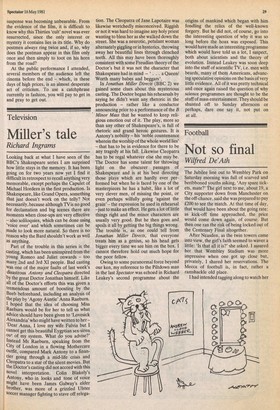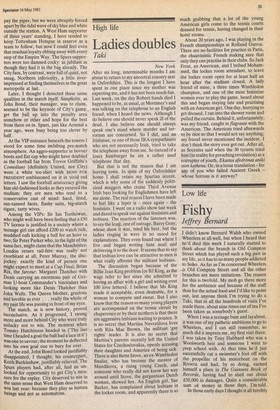Football
Not so final
Wilfred De'Ath
The Jubilee line out to Wembley Park on Saturday morning was full of scarved and beribboned youths asking, 'Any spare tickets, mate?' The girl next to me, about 19, a City supporter down from Manchester on the off-chance, said she was prepared to pay £200 to see the match. At that time of day, that would have been about the going rate: as kick-off time approached, the price would come down again, of course. But then one ran the risk of being locked out of the Centenary Final altogether.
After Neasden, as the twin towers came into view, the girl's faith seemed to waver a little: 'Is that all it is'?' she asked. I assured her that Wembley Stadium was more impressive when one . got up close but, privately, I shared her reservations. The Mecca of football is, in fact, rather a ramshackle old place.
I had intended tagging along to watch her pay the piper, but we were abruptly forced apart by the tidal wave of sky blue and white outside the station. A West Ham supporter of three years' standing, I have tended to keep Tottenham Hotspur in reserve as a team to follow, but now I could feel even that residual loyalty ebbing away with every step of the Empire Way. The Spurs supporters were too damned cocky: as jubilant as though they had it in the bag already. The City fans, by contrast, were full of quiet, not smug, Northern inferiority, a little overimpressed at finding themselves in the great metropolis at last.
Later, I thought I detected these same qualities in the match itself. Simplicity, as John Bond, their manager, was to claim, seemed to be the keynote of City's game:. get the ball up into the penalty area somehow or other and hope for the best from there on in. Spurs, just like Arsenal a year ago, were busy being too clever by half.
At the VIP entrance beneath the towers I stood for some time imbibing pre-match atmosphere. An aggro-supporter in bovver boots and flat cap who might have doubled as the football fan from Trevor Griffiths's Comedians (definitely United, not City) wore a white tee-shirt with BENN FOR PRESIDENT emblazoned on it in vivid red letters. I saw the football aristocracy giving him old-fashioned looks as they entered the stadium: they are men who tend to a conservative cast of mind: hard, lined, sun-tanned faces, flashy suits, big-match Cigars, tarty wives.
Among the VIPs: Sir Ian Trethowan, who might well have been feeling that a £50 TV licence is justified in a society where a teenage girl can afford £200 to watch rich, muddied oafs kicking a ball for an hour or two; Sir Peter Parker who, in the light of the same fact, might claim that the ManchesterLondon return rail-fare was really not exorbitant at all; Peter Murray, the discjockey: exactly the kind of person one might expect to meet at a Cup Final; Brian Rix, the farceur: Margaret Thatcher with Denis carrying an enormous pair of German U-boat Commander's binoculars and looking more like Denis Thatcher than John Wells. The Queen Mother, gracious and lovable as ever . . . really the whole of my past life was passing in front of my eyes. The match, as is now history, proved inconclusive. As it progressed, I swung more and more behind City who were truly unlucky not to win. The moment when Tommy Hutchinson headed in (`The last time I headed a goal the ball had a lace in it') was one to savour; the moment he deflected into his own goal one to bury for ever. At the end, John Bond looked justifiably disappointed, I thought; his counterpart, Keith Burkinshaw, justifiably relieved. The Spurs players had, after all, had an unlooked for opportunity to get City's measure for the replay. City deserved to win in the same sense that West Ham deserved to Win last year: because they play as human beings and not as automatons.











































 Previous page
Previous page